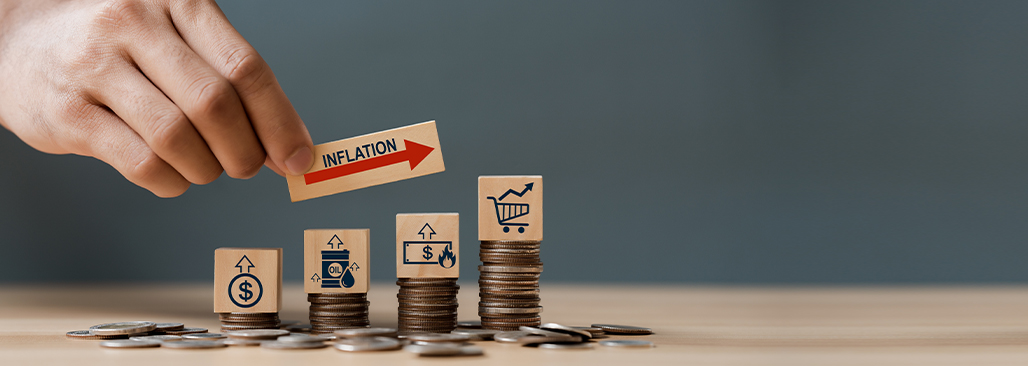Managing Money | Money Basics
How to manage your budget with inflation

Inflation is the highest it’s been since December 2008, with October recording a 7.7% inflation rate . Inflation last month October 2022 was mainly due to the ongoing increase in prices for essential food items, according to the Bangko Sentral ng Pilipinas (BSP).
The average inflation rate for the first seven months this year was 4.7 percent, which is higher than the BSP's target range of 2-4 percent.
Let’s take a closer look at how inflation can change your spending habits and discuss ways to improve your budgeting during inflation.
How does inflation affect budgeting for the family?
Inflation is a key economic concept that can have a significant impact on Filipino families and their budgets. Inflation is the sustained increase in the general price level of goods and services in an economy. This can lead to Filipino families having to spend more money on everyday items, which can put a strain on their finances.
Inflation can have a major impact on people's day-to-day lives, as they may find it difficult to afford basic necessities. For example, if the price of bread rises by 10% in a single month, this will likely cause hardship for families who are struggling to make ends meet.
As prices increase, families must learn how to budget for inflation. This can be a challenge, especially for those who are living paycheck to paycheck. Inflation drives some into poverty. When prices go up, but wages stay the same, it becomes difficult for people to afford basic necessities like food and shelter.
Inflation can also lead to higher interest rates, as lenders try to offset the loss of value of their money. This can make it more difficult for people to obtain loans for major purchases, such as homes or cars.
If you're worried about inflation affecting you, here are some tips on how you can cope with inflation.
How to budget for inflation
While we can’t control the economy directly, we have full control of our budgets. Here are things you can do to help you budget properly during an inflation:
-
Be mindful of your spending
Today’s economy emphasizes the importance of managing finances, and the first step here is to be mindful of your spending. Tracking your spending for even just a few weeks can help you to see where you can cut back.
For example, if you spend PHP 500 a week on coffee, that's PHP 2,000 a month or PHP 24,000 a year--money that could be going towards savings or investments.
There are a lot of helpful budgeting tools available online that can make it easy to see where your money is going, such as a personal checking account that can help you track all your expenses. Once you have a better idea of your spending patterns, you can start to make changes that will help you save money in the long run.
-
Categorize expenses into needs, values, and wants
One way to develop good money habits is to understand the essence of your expenses. Every thing you buy falls under one of three categories: needs, values, or wants.
- Needs – food, utilities, housing, healthcare, transportation
- Values – housing location, gym membership, brands of goods
- Wants – eating out, high-end gadgets, toys or collectibles
You don’t need to eliminate expenses under values and wants for inflation budgeting. Instead, you can allot a specific amount to ensure you don’t come up short on important things like your health or savings.
-
Have an emergency fund
An emergency fund is crucial for dealing with unexpected events, like a medical emergency or car repairs. Aim to have at least three to six months' worth of living expenses set aside in a savings account so you know you can cover yourself in case of tough times.
That way, if you lose your job or have a major unexpected expense, you won't have to borrow money and rack up debt. Instead, you can focus on getting back on your feet without the added stress of financial worry.
-
Save up for big-ticket items in advance
One of the smartest things you can do when it comes to making a big purchase is to start saving up for it in advance. This way, you'll be able to afford the item without pinching too much from your budget during inflation or racking up more debt.
By doing this, you'll have a head start on your down payment, which will help you take advantage of lower interest rates and manage your credit card debt better. In addition, you'll also be less likely to experience buyer's remorse later on down the road.
-
Invest in inflation-proof assets
Inflation-proof assets are those that maintain their purchasing power over time. They retain their value, even when prices for other goods and services are rising. This can be a valuable quality in uncertain economic times.
There are a few different types of assets that tend to be inflation-proof. One category is precious metals, such as gold and silver. Gold, in particular, has been used as a form of currency and store of value for centuries. Another type of inflation-proof asset is land.
While the price of land can fluctuate in the short term, it tends to increase in value over the long term. This is because there is a limited amount of land available, while the population continues to grow.
Don’t survive; thrive with an inflation budget
Inflation can be unpredictable, which is why it’s important to learn how to budget with inflation as part of your financial planning. With proper budgeting, you can stay in control of your finances, ensuring that your budget can cover all your necessities and still have room for some of life’s pleasures and future planning.
More Smart Reads